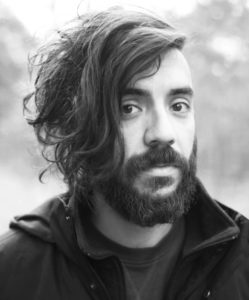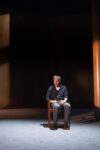 Kaveh Akbar’s recent poetry collection Calling a Wolf a Wolf takes the reader along Akbar’s path through recovery. The writing is intense; Akbar writes about the pain of addiction, the desire for other bodies, and for self-mastery with a level of emotional intimacy that would need an astonishing bravery. A line in the opening poem reads: ‘regarding loss, I’m afraid / to keep it in the story, / worried what I might bring back to life.’ Calling a Wolf a Wolf depicts an occasionally frantic speaker on his ‘fumble towards grace’. Akbar conveys with language that is at times tender and at others severe and unforgiving, the disorienting struggle that accompanies shedding an old self and nurturing a new one.
Kaveh Akbar’s recent poetry collection Calling a Wolf a Wolf takes the reader along Akbar’s path through recovery. The writing is intense; Akbar writes about the pain of addiction, the desire for other bodies, and for self-mastery with a level of emotional intimacy that would need an astonishing bravery. A line in the opening poem reads: ‘regarding loss, I’m afraid / to keep it in the story, / worried what I might bring back to life.’ Calling a Wolf a Wolf depicts an occasionally frantic speaker on his ‘fumble towards grace’. Akbar conveys with language that is at times tender and at others severe and unforgiving, the disorienting struggle that accompanies shedding an old self and nurturing a new one.
I spoke with Akbar over email about addiction literature, the poetry community, and the cliché idea of willpower.
Aida Amoako: Calling a Wolf A Wolf contains some poems from your chapbook Portrait of the Alcoholic. I’ve heard you describe the latter as the EP to Calling a Wolf a Wolf’s LP. How did you shape this new collection?
Kaveh Akbar: There is for many poets a magic moment where you throw all the poems you’ve written for the past many years out across a table and then, with some luck, find that they begin to rise and stick to your forehead, flying up in a coherent order like steel to a magnet.
How do you look at your published work? Is it like viewing an archive or an old diary? How does it feel to read your poetry in a form that’s meant for presentation to a reader?
Every poem I’ve published is a portal back into a person I’ve been. I’m no longer the man who wrote Calling a Wolf a Wolf, but through reading those poems, I can access him, better understand him, love and forgive and laugh with him.
I think even to this day people hold quite stereotypical ideas of what a poet is and what they do. What is a poet to you?
Mary Leader says: “A poem is a thing.” By that definition, a poet would be someone who makes things. I think any narrower definition would seem to me needlessly exclusive.
You’ve spoken before about the poetry community which may sound to some almost oxymoronic because writing poetry is seen as this very solitary endeavour. How has the poetry community become important to you?
People perceive poetry to be this thing way out at the margins of human interest. The expansiveness, the vitality of the community of poets in which I find myself proves otherwise!
There are these brilliant lines in ‘Against Dying’ you write, ‘I spent so long in a lover’s / quarrel with my flesh / that peace seems over-/cautious […] we speak to each other / in this code where every word / means obey’. It complicates this simple idea we have of willpower, especially when it comes to addiction, as the mind holding dominion over the body, by showing the body pushing back. Could you speak to this permeating sense throughout your poems of mind/body negotiation being a two-way thing?
Thank you for reading the poem so beautifully. As a person in recovery, I am in a constant negotiation with my body. In a lot of ways, I feel I’ve been given a second chance at being a person, a chance to undo some of the damage levied upon the world by the old me. But the old me lived in this same body, and sometimes this body misses him terribly and resents me for his absence. It’s endlessly complicated and feels totally different every day. This poem orbits that difference, that complexity.
What I also thought was interesting was this tension between work/effort and reward. In several poems your speaker is brutally honest and self-aware about the desire for a fanfare. Does any of the desire to publish your poetry have a relationship to that desire for acknowledgement of effort?
I try to be as searching and fearless as I can be in the field of a poem. I’ve gotten to the point where I can usually be wholly open in that space. But, I’m still learning to calibrate that openness/restraint everywhere else.
I heard your work referred to as ‘addiction literature’. What do you make of the term and that categorisation?
I mean, it’s a book that deals with addiction, and it’s (hopefully) literature! I’m not overly invested in taxonomizing things. The book’s title itself is from a line that explores the impotence of naming. That said, the great ambition of the book is that it might find its way into the hands of people for whom it might be useful. If it’s explicitly billed as “addiction literature,” maybe that could help it find those people. I don’t really have a strong sense of how these things work.
You also are a professor at Purdue. Has teaching changed how you see your work or the role of a poet (if they have a role at all)?
My students are constant exemplars of the earnest curiosity and permeability to wonder required of all serious poets.
What poet would you recommend to somebody who is looking to really start reading poetry?
All of them! I think it’s most important for new poets to read widely, to discover all the things poetry can be. Subscribing to Poetry Magazine is a great way to do this. There are tons of incredible, free online journals like Waxwing, Tongue, Boston Review, as well as flagship print journals that put content online like Poetry, VQR, and American Poetry Review. It’s never been easier to be well-read.
Aida Amoako is a freelance writer from London who has written for publications such as Tank Magazine, the Quietus and Jstor Daily.
This post may contain affiliate links.







